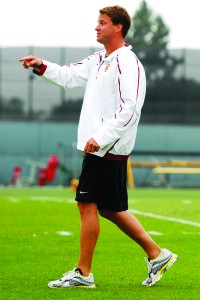Trojans file appeal of NCAA sanctions
After absorbing a harsh blow by the NCAA, USC has decided to fight back.
The university will appeal the several sanctions — a two-year bowl ban and a loss of 30 scholarships from 2011-2013 — deemed “too severe” and “inconsistent with precedent.”
“We disagree with many of the findings in the report from the NCAA Committee on Infractions and assert that the penalties imposed are too severe for the violations identified and are inconsistent with precedent in similar cases,” said Todd Dickey, USC’s senior vice president for administration, in a statement released Friday.

Not in control · First-year coach Lane Kiffin and the Trojans hope the school’s appeal will allow them to compete in a bowl game in 2011-2012. - Geo Tu | Summer Trojan
In the release, USC announced it will ask for the two-year bowl ban to be reduced to one year. The university also seeks a reduction in scholarship penalties for the football program — instead of losing 10 scholarships each year from 2011-2013, the Trojans are asking it be reduced to five each year.
The NCAA infractions committee plans to meet in late September and early November, but, with the time frame given, USC decided to accept the bowl ban for the upcoming season and hope the NCAA will leave it at that.
A four-year investigation of the university’s athletic program resulted in a 67-page report that penalized USC for a lack of institutional control.
Two of the primary culprits listed in the report included former football Heisman Trophy winner Reggie Bush and basketball one-and-done prep star O.J. Mayo.
The football team was not the only subject of controversy for the university. The men’s basketball team and women’s tennis team were also cited in the report, but the NCAA did not take any further action against the basketball team.
Earlier this year, the university self-imposed sanctions on the basketball team, banning it from postseason play for the 2009-2010 season, forfeiting all victories in the only season Mayo was eligible and reducing the amount of scholarships the program is allowed to use for the next two years.
Bush received lavish gifts from two would-be sports marketers — Lloyd Lake and Michael Michaels — and his family also accepted payments for hotel stays and a rent-free home in San Diego.
“The university recognizes that violations of NCAA rules did occur, especially involving impermissible benefits going to student athletes as well as their friends and families, from unscrupulous sports agents and sports marketers,” Dickey said. “We take full responsibility for those violations, given that they happened on our watch.”
The NCAA declared Bush was ineligible to play beginning in December 2004 and, in turn, USC was ordered to forfeit every victory in which Bush participated while ineligible.
Bush’s Heisman Trophy could be revoked as well. Members of the Heisman Trust said they might review Bush’s award if the NCAA deemed him ineligible.
Bush has acknowledged no wrongdoing and vowed to help USC fight the sanctions.
“I’m going to do everything I can to make this right, some way, somehow, some shape or form, if it’s the last thing I do,” he said.
The appeals process will take at least several months, and many experts believe an answer in the spring would be the best-case scenario for the university.
In that situation, an NCAA overturning of the original ruling and upholding the terms of USC’s appeal would put the school in immediate position to compete in a bowl game — and halve the number of scholarships lost.
USC has already begun to find recruits to enroll in January to help bypass the NCAA’s mandated scholarship limits that kick in next fall.
